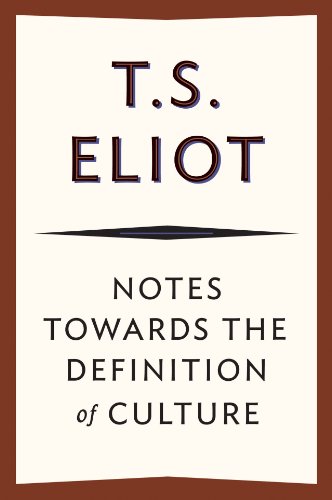Notes Towards the Definition of Culture
T. S. Eliot
BOOK REVIEW

In Notes Towards the Definition of Culture, T. S. Eliot embarks on a journey that explores the intricate web of cultural identity, confronting the essence of what it means to be civilizationally "cultured." Beneath the surface of this compact yet profound text lie countless threads of thought that weave through the very fabric of society. Eliot doesn't just inscribe ideas on paper; he thrusts upon us a mirror that dares us to look closely at the contours of our cultural existence.
Eliot's sharp intellect prowls through concepts of culture, teasing out definitions that escape the grasp of simple categorization. He skillfully navigates the complexities of tradition versus modernity, urging us to grasp that culture is not merely a superficial collection of societal norms, but a pulsating lifeblood that shapes and informs our collective psyche. Each sentence is like a drop of ink, seeping into the fibers of your consciousness, leaving stains of reflection that linger long after the page is turned.
Set against the backdrop of the early 20th century, Eliot's insights emerge amid the tumult of two World Wars and a rapidly modernizing world. This historical context is critical, as it frames his exploration of the intersection between the individual and communal identities. The socio-political upheaval of the time compelled him to articulate a vision of culture that balances the past with the inevitable rush of progress. "Culture," he asserts, becomes the touchstone through which we can navigate the treacherous waters of change, grounding ourselves in shared histories and collective experiences.
Eliot's work echoes in the chambers of intellectual thought, resonating not only with contemporaries like Ezra Pound and James Joyce but also with modern thinkers grappling with the same questions of identity and heritage. The ripples of his philosophy extend into multiple realms-literature, politics, and even ethical perspective-rendering his reflections universals worth grappling with. It's as if Eliot reaches out from the pages of his book and grabs you by the shoulders, compelling you to wake up to the cultural undercurrents flowing through your own life, whether you choose to recognize them or not.
Diving deeper, it's vital to examine the reactions his work provokes among readers. Reviews often oscillate between admiration and criticism, with some praising Eliot's profound insights and others challenging the elitism perceived in his articulations of culture. Critics argue that his definitions can feel exclusive, as if culture exists in a rarefied space that is unattainable to the average person. Yet, isn't that precisely the reaction Eliot aims to arouse? As you contemplate his words, consider the unsettling discomfort that arises-could it be the very essence of confronting the complexities of cultural and individual identity?
Moreover, the fight against this perceived elitism is a reflection of broader societal tensions. Eliot dares us to confront the evolution of culture in a world where globalism threatens to dilute local customs and traditions. In this sense, Notes Towards the Definition of Culture is not just a scholarly pursuit; it is a powerful call to arms for defenders of cultural heritage against the tides of homogenization and mediocrity.
Just when you think you grasp his intent, Eliot weaves in poetic flourishes, rendering his prose almost lyrical. The language dances off the page, intoxicating you with its complexity and beauty. Words resonate with a cadence that invites rereading, encouraging you to dive into the nuances of his arguments. The texture of his writing, alive with ideas and emotive power, captivates-taking you on a rollercoaster ride through intellect and emotion.
Eliot's legacy is formidable, extending far beyond his own time to influence writers, philosophers, and cultural critics to this day. Figures like C.S. Lewis have drawn upon his cultural critiques, utilizing them as a foundation to challenge moral decay and advocate for a renaissance of deeper understanding. Imagine the power of those ripples, the intellectual tidal wave born from his nuanced observations about community, individuality, and shared narratives.
In handing you this text, Eliot sets before you not just a book, but a remarkable journey that invites you to reassess your understanding of culture itself. With every line, he compels you to interrogate your own life, your values, and the collective identity you inhabit. The cultivation of culture, in Eliot's view, is not a passive reception, but an active participation taken up by every individual.
As the pages of Notes Towards the Definition of Culture turn, they invite you to confront your own preconceptions and, ultimately, the essence of community. Can you feel the cultural pulse? Can you hear the silent demands of history echoing through the halls of modern society? Through Eliot's lens, you are left with a chilling hope that perhaps our recognition of culture might yet lead to a richer, more connected human experience. Reading his work is more than an academic exercise; it's an awakening-a spark that ignites a flame, driving you toward ever-greater understanding of what culture could and should be for individuals and society alike. 🌍🔥
📖 Notes Towards the Definition of Culture
✍ by T. S. Eliot
🧾 132 pages
2014
#notes #towards #definition #culture #eliot #TSEliot